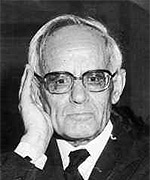 In Philosophy, even in this day an age, one is, at least to some degree, either a Platonist or an Aristotelian. So, in Christian theology even now, one is either primarily an Augustinian or a Thomist. Of course, the Plato/Aristotle distinction is operative in the Augustinian/Thomist dichotomy; with Augustine being the Platonist and Thomas the Aristotelian. Perhaps what distinguishes Pope Benedict XVI and his dear friend, whose closest collaborator he was, Pope John Paul II, is that John Paul had a primarily Thomistic outlook, while Benedict is an Augustinian through-and-through. One of the issues most central to this theological split is anthropology, the nature and orientation of the human person. Jesuit theologian,
In Philosophy, even in this day an age, one is, at least to some degree, either a Platonist or an Aristotelian. So, in Christian theology even now, one is either primarily an Augustinian or a Thomist. Of course, the Plato/Aristotle distinction is operative in the Augustinian/Thomist dichotomy; with Augustine being the Platonist and Thomas the Aristotelian. Perhaps what distinguishes Pope Benedict XVI and his dear friend, whose closest collaborator he was, Pope John Paul II, is that John Paul had a primarily Thomistic outlook, while Benedict is an Augustinian through-and-through. One of the issues most central to this theological split is anthropology, the nature and orientation of the human person. Jesuit theologian,Fr. Karl Rahner, was a Thomist. In fact, he called his theological method
"transcendental Thomism." In his CT article, Williams writes of Rahner's
theological anthropology, that he "held that human beings have a fundamental
orientation toward goodness, truth, and love, and that at the soul's bottom
there exists an orientation toward God." For Rahner, according to Williams,
"people merely have to be reminded of the good, and they will seek
it."Augustinians, such as myself, while not necessarily dismissing the
fundamental goodness at the bottom of the human soul, see that people do not
always seem to be oriented toward the good, toward God."
Some Augustinians, Calvinists, to take but one example, argue for the total depravity of the unredeemed human soul. It is not too much to insist that the facts on the ground often seem to support this thesis. Human history shows us, Williams observes, that "letting humanity choose whatever works to its own advantage results in the primacy of self-interest and personal gain." Further, unless we are obliged "as well as enabled to see what is good, [we] will not freely choose it, because it will not immediately seem to be in [our] self interest."
Read the Deacon's full blog post (here)
But then again, "Can you trust anything that Rahner says, in the light of this."










1 comment:
I suppose my response would be that if moral impeccability is required in order to be believed, then we can believe no one, not even myself. Of course, this is my Augustinianism coming forth.
While, if true, this would be disappointing, it is also important not to be quick to believe the worst, or to act as if we know everything that is relevant.
Post a Comment